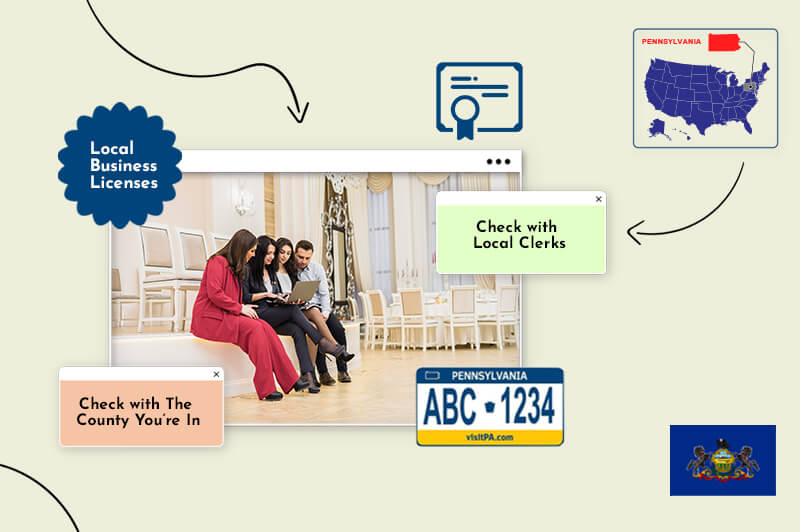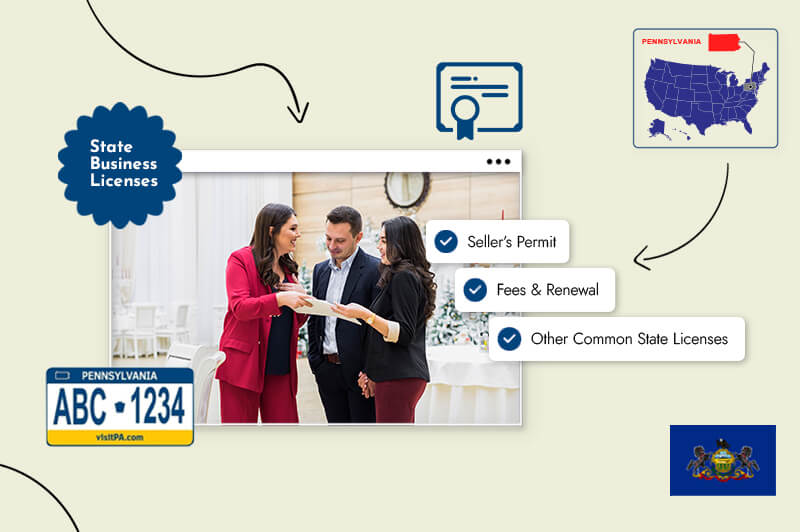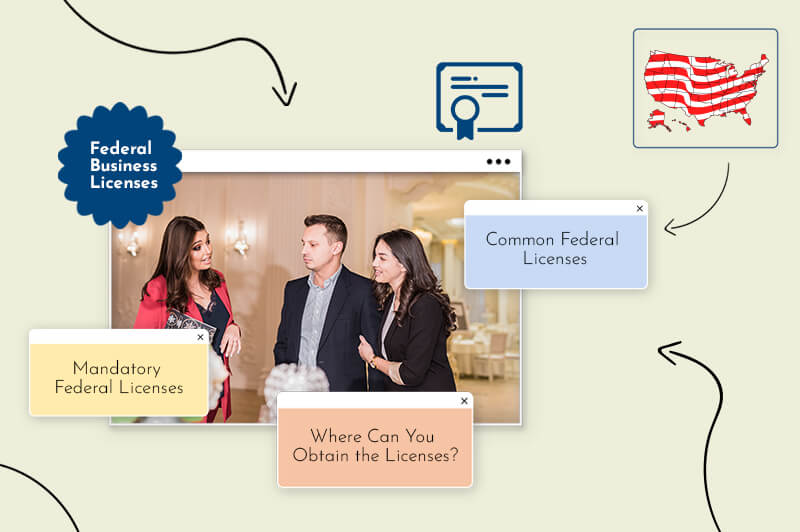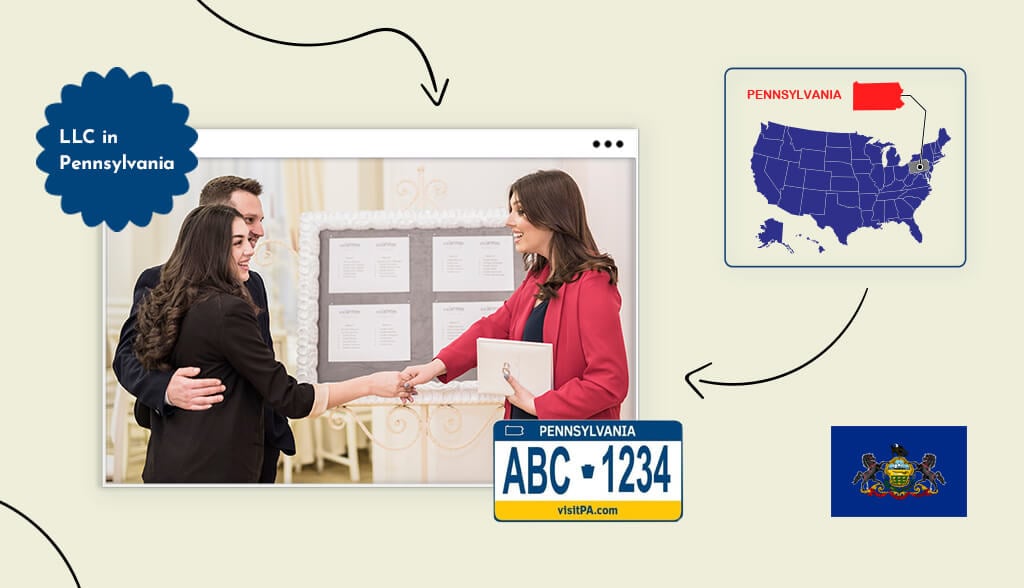Running a small business requires obtaining licenses and permits to operate legally at the federal, state, and local levels. Understanding the requirements for starting a business in Pennsylvania will help ensure you know which licenses and permits apply to your specific industry and location.
An LLC serves to aid you in the acquisition of licenses and permits from various licensing bodies, and the LLC itself is a type of business entity. It’s true that you can get permits and licenses without having an LLC in place, but you’ll find that understanding how to get an LLC in PA can provide your business with added legal protection and credibility.
Here’s a look at what you can expect when looking into business licenses and permits for your business.
What are business licenses and permits?
Business licenses and permits are legal instruments that allow you to operate your business or perform a service without fear of reprisal from the government. In turn, the government issues you the relevant license or permit because you’ve demonstrated that you are capable of following the regulations that are represented by the permit or license.
The state of Pennsylvania doesn’t oversee licenses and permits for businesses as a general rule. Instead, these items are handled at the local level. There are some exceptions, such as the Pennsylvania Department of Environmental Protection, but you’ll have to check with your local city hall for the licenses and permits you need for your LLC.
Business licenses
The type of business you operate will dictate the type of business license you need to obtain to operate. Some businesses, such as a home-based service business, may not require a license at all since you’re not open to the public. In contrast, a business selling physical goods out of a brick-and-mortar location needs to have a local business license and a state resale tax license for selling to the public. Businesses that serve food and liquor need the relevant licenses to serve these items to the public.
You can find out more about what your locality needs in terms of licenses and permits on the PA Business One-Stop Shop website.
Permits
Permits are different from licenses in that they’re intended for a specific purpose, such as building a home or installing a mechanical system. When you apply for a permit, you may be required to show plans and intent for the work you’re doing and show that you can adhere to the local codes covered by the permit.
How to register for licenses/permits
Check with your city hall to find out where you need to go to apply for licenses and permits. You may be able to apply for some online, while others require you to schedule an appointment with the relevant department.
What happens if I fail to obtain a license?
Failure to obtain a license can result in you getting fined and potentially taken to court for violating the municipal code.
Local business licenses

As previously mentioned, the Commonwealth of Pennsylvania leaves licensing up to local governing bodies. You’ll need to check with your city hall to find out what licenses and permits you need along with how to obtain them.
Check with local clerks
This should be your first stop to learn about the licenses and permits that apply to your business. City clerks are versed in the local regulations and laws and can help you get what you need to operate in compliance.
Check with the county you’re in
There may be permits and licenses issued by the county that the local clerks are unaware of. Check the website of your county seat or the state and local departments that are relevant to the operation of your business. If you don’t find the information you’re looking for online, call the departments that relate to your business and ask for guidance.
State business licenses

The Commonwealth of Pennsylvania requires you to obtain a license that enables you to remit the taxes you’ve collected to the Department of Revenue. You only need to get one license for all of the taxes you collect during the operation of your business.
Seller’s permit: what is it?
The Pennsylvania seller’s permit, known as the PA-100, is an all-purpose number that enables a business to submit sales taxes it has collected to the Department of Revenue. You must have a seller’s permit if you’re selling tangible goods or providing taxable services according to state law.
How to obtain a seller’s permit
You need to file for your seller’s permit through the Pennsylvania Department of Revenue’s website that’s designed specifically for the purpose. The only way to obtain your permit is through an online form, as the department doesn’t accept any other method of application.
Obtaining the permit is straightforward, but follow the instructions as you fill out the form. Leaving out information or making a mistake can delay the processing of your application. There is no charge to get your seller’s permit, and you won’t be asked for any form of payment.
Fees & renewal
Just as there are no fees for the application of your seller’s permit, there are no fees for renewal. The seller’s permit has to be renewed every five years, but the DOR does this automatically for you if you have no outstanding returns or taxes due. In the event you owe taxes, you won’t be able to renew your seller’s permit until you’ve paid what you owe.
The DOR provides you with a notice of outstanding taxes owed and will provide you with the phone number of the appropriate person to contact. This person can help you with resolving your issues.
Other common state licenses
The only common state license is an environmental project permit for businesses that participate in projects that may impact the environment. You can find out more at the PA Department of Environmental Protection to find out if your business needs this type of permit.
Federal business licenses

Federal business licenses are required for businesses that are engaged in an activity that’s under the supervision of a federal agency. You’ll need to apply for a license from the relevant regulatory agency in order to run your business legally and give your customers the peace of mind that you’re approved by the federal government to operate.
Are there mandatory federal licenses?
Your business may need a federal license to legally operate, but only if you’re engaging in certain activities as part of your business. In these instances, it’s mandatory to get a federal license.
Common federal business licenses
The common federal business licenses include:
- Agriculture
- Alcoholic beverages, including importing, manufacturing, wholesaling, and retailing
- Aviation
- Firearms, ammunition, and explosives, including the manufacture of, dealing, and importation
- Fish and wildlife
- Commercial fisheries
- Maritime transportation
- Mining and drilling
- Nuclear energy
- Radio and television broadcasting
Where can you obtain the licenses?
You’ll need to apply with the appropriate agency to obtain the correct license. Getting a federal license can be detailed and involved, and you may wish to obtain legal counsel familiar with applying for federal licenses.
What do I need to file for a license?
The information required to file for a license is dependent on the type of work or activity your business engages in. At a minimum, you’ll need the business name, contact information, address, and the responsible party for the license. You may need the certificate of organization and the EIN number to prove that your business has been fully registered with the state and IRS and is operating in accordance with the laws.
Always read the application instructions before filling it out. The instructions tell you what information is needed for the license or permit, and you can put all of the relevant information together so it’s handy as you fill out the application.
Conclusion
The need to get licenses and permits for your business comes down to the type of business you’re running. Some licenses, such as the seller’s permit, are required to remit various taxes while others may not apply to your business. If you’re not sure of which ones you need, check out the web pages for the relevant state agencies and local governing bodies, and don’t hesitate to pick up the phone if you don’t get answers. Last, but not least, consider consulting with experts in the same field you’re in about what’s needed, or contact a lawyer who handles these issues and have them help you get the licenses and permits you need.
